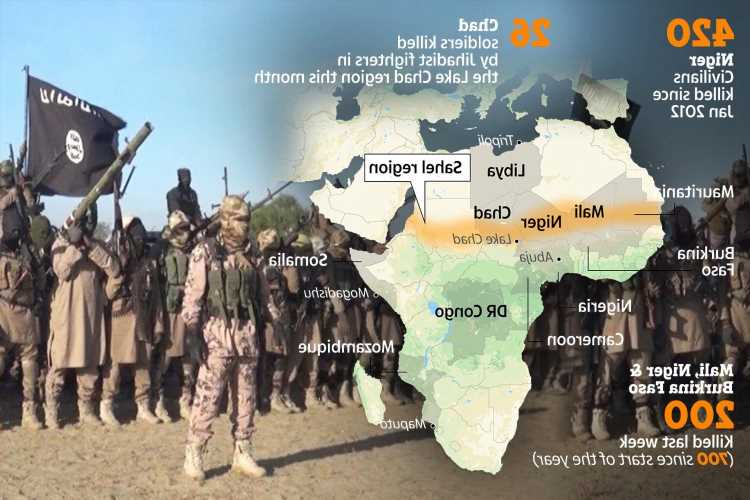MORE than 200 people have been massacred by al-Qaeda and ISIS in Africa in the last week amid fears a terror wave could hit the UK in the wake of the collapse of Afghanistan.
The recent attacks in Niger, Mali and Burkina Faso could be a chilling sign of the jihadists' growing confidence of victory in Africa as chaos unfolds in Kabul under the ruthless rule of the Taliban.
According to The Times, the death toll from the worsening insurgency linked to ISIS and al-Qaeda has rocketed to more than 700 since the start of the year – and displaced some seven million people in the Sahel region.
The jihadist surge in Africa has sparked fears that the biggest terror threat to Europe – and the UK – now lies on the continent.
And there are also fresh fears that US weapons left behind by troops could be smuggled into Africa along well-trodden drug routes via Pakistan to arm the fanatics.
Former prime minister Tony Blair warned the decision to abandon Afghanistan has left "every jihadist group around the world cheering".
Corinne Dufka, Sahel director at Human Rights Watch, told The Times: "It appears Africa is rapidly becoming the epicentre of armed Islamist activity and abuse.
"In the Sahel, these groups have overwhelmed the region’s armies and fed on challenging geography and weak and often corrupt governance."
In April, dozens of innocent people, including foreign oil workers, were ruthlessly killed when ISIS terrorists went on the rampage in the key industrial town of Palma, in Mozambique.
The UN said "the absence of significant counter-terrorist measures" in the country have transformed the ISIS affiliate in central Africa into a "major threat".
Africa is now "the region most affected by terrorism" and has the "largest numbers of casualties".
Chad has problems with jihadist violence in the Lake Chad region that borders Niger, Nigeria and Cameroon, while Somalia, Mozambique and the Democratic Republic of Congo are also battling Islamist extremists.
The Pentagon warned Islamic State is taking over swathes of Africa like it did in Syria and Iraq with "staggeringly brutal" tactics.
We could see bandwagon attacks – attacks from lone actors, rather than being directed by a group.
Leading terror expert Raffaello Pantucci told The Sun Online: "Africa is becoming a dominant feature of global jihadist scene.
"But what is happening Africa predates the fall of Afghanistan, it has been on a upward trajectory for the last couple of years and it's a major problem.
"But we will see groups using the rhetoric of victory – and see the sense of victory building."
Although Pantucci said most jihadist attacks in Africa remain on the continent, he warned attacks on the UK "could still happen".
"We could see bandwagon attacks – attacks from lone actors, rather than being directed by a group," he said.
With the Taliban overtake of Afghanistan, fears have been raised the country will once again be a haven for terrorists.
'SAFE HAVEN FOR TERRORISTS'
Former army officer Colonel Richard Kemp previously told The Sun Online: "The outlook for Afghanistan is bleak and there are severe implications for the West too.
"It will be portrayed as a defeat of the US and embolden jihadists, leading the more attacks on the West. It will become a safe haven for terrorists.
“Jihadis will go there to train and prepare to be terrorists. This is what happened before 9/11 and it’s quite likely there will be more attacks on the West."
A report to the UN Security Council has warned both ISIS and al-Qaeda are growing in strength on the continent.
"This is especially true in parts of West and East Africa, where affiliates of both groups can boast gains in supporters and territory under threat, as well as growing capabilities in fundraising and weapons, for example, in the use of drones,” said the report.
Dufka said African countries and their international partners "should address head on the issues that have underscored decades of instability and opened the door to abusive armed groups".
"This is especially true in parts of West and East Africa, where affiliates of both groups can boast gains in supporters and territory under threat, as well as growing capabilities in fundraising and weapons, for example, in the use of drones,” said the report.
Source: Read Full Article





